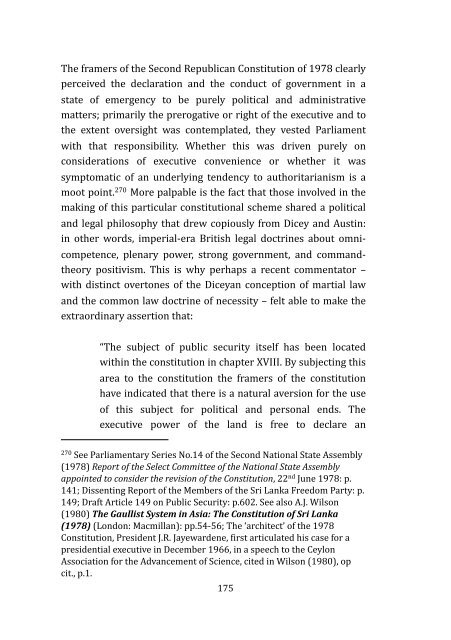States of Emergency - Centre for Policy Alternatives
States of Emergency - Centre for Policy Alternatives
States of Emergency - Centre for Policy Alternatives
Create successful ePaper yourself
Turn your PDF publications into a flip-book with our unique Google optimized e-Paper software.
The framers <strong>of</strong> the Second Republican Constitution <strong>of</strong> 1978 clearly<br />
perceived the declaration and the conduct <strong>of</strong> government in a<br />
state <strong>of</strong> emergency to be purely political and administrative<br />
matters; primarily the prerogative or right <strong>of</strong> the executive and to<br />
the extent oversight was contemplated, they vested Parliament<br />
with that responsibility. Whether this was driven purely on<br />
considerations <strong>of</strong> executive convenience or whether it was<br />
symptomatic <strong>of</strong> an underlying tendency to authoritarianism is a<br />
moot point. 270 More palpable is the fact that those involved in the<br />
making <strong>of</strong> this particular constitutional scheme shared a political<br />
and legal philosophy that drew copiously from Dicey and Austin:<br />
in other words, imperial‐era British legal doctrines about omnicompetence,<br />
plenary power, strong government, and commandtheory<br />
positivism. This is why perhaps a recent commentator –<br />
with distinct overtones <strong>of</strong> the Diceyan conception <strong>of</strong> martial law<br />
and the common law doctrine <strong>of</strong> necessity – felt able to make the<br />
extraordinary assertion that:<br />
“The subject <strong>of</strong> public security itself has been located<br />
within the constitution in chapter XVIII. By subjecting this<br />
area to the constitution the framers <strong>of</strong> the constitution<br />
have indicated that there is a natural aversion <strong>for</strong> the use<br />
<strong>of</strong> this subject <strong>for</strong> political and personal ends. The<br />
executive power <strong>of</strong> the land is free to declare an<br />
270<br />
See Parliamentary Series No.14 <strong>of</strong> the Second National State Assembly<br />
(1978) Report <strong>of</strong> the Select Committee <strong>of</strong> the National State Assembly <br />
appointed to consider the revision <strong>of</strong> the Constitution, 22 nd June 1978: p.<br />
141; Dissenting Report <strong>of</strong> the Members <strong>of</strong> the Sri Lanka Freedom Party: p.<br />
149; Draft Article 149 on Public Security: p.602. See also A.J. Wilson<br />
(1980) The Gaullist System in Asia: The Constitution <strong>of</strong> Sri Lanka <br />
(1978) (London: Macmillan): pp.54‐56; The ‘architect’ <strong>of</strong> the 1978<br />
Constitution, President J.R. Jayewardene, Lirst articulated his case <strong>for</strong> a<br />
presidential executive in December 1966, in a speech to the Ceylon<br />
Association <strong>for</strong> the Advancement <strong>of</strong> Science, cited in Wilson (1980), op<br />
cit., p.1.<br />
175











